-
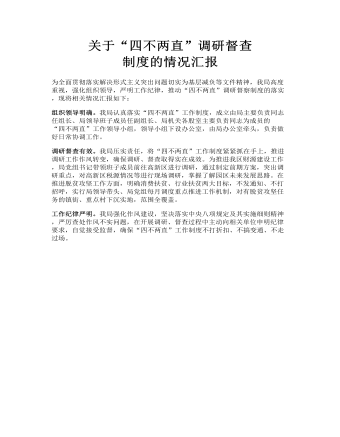
关于“四不两直”调研督查 制度的情况汇报
组织领导明确。我局认真落实“四不两直”工作制度,成立由局主要负责同志任组长、局领导班子成员任副组长、局机关各股室主要负责同志为成员的“四不两直”工作领导小组,领导小组下设办公室,由局办公室牵头,负责做好日常协调工作。
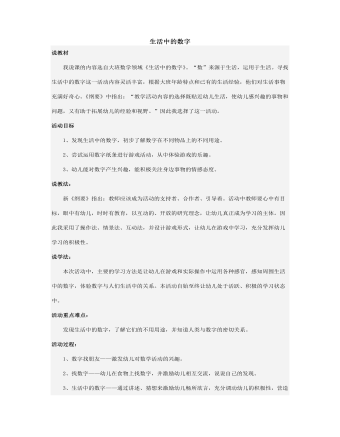
生活中的数字说课稿
1、数字找朋友——激发幼儿对数学活动的兴趣。 2、找数字——幼儿在食物上找数字,并激励幼儿相互交流,说说自己的发现。 3、生活中的数字——通过讲述、猜想来激励幼儿畅所欲言,充分调动幼儿的积极性,营造轻松愉悦的氛围,拓展幼儿已有的生活经验。 4、幸运号码——通过游戏发现数字的趣味性和丰富性,从而更真切的体会数字的神奇,随便的调换数字的位置就可以排成不同的数字组合。 5、设计电话号码——幼儿运用已有的知识解决问题,为自己编电话号码。让没个幼儿参与其中,从而体验成功感,使他们对数字产生极大的兴趣,激励幼儿在生活中主动观察事物和运用数字,为以后学习奠定基础。
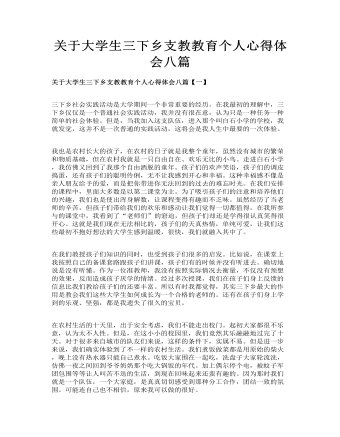
关于大学生三下乡支教教育个人心得体会八篇
我也是农村长大的孩子,在农村的日子就是我整个童年,虽然没有城市的繁荣和物质基础,但在农村我就是一只自由自在、欢乐无比的小鸟。走进白石小学,我仿佛又回到了我那个自由洒脱的童年。孩子们的欢声笑语,孩子们的调皮捣蛋,还有孩子们的聪明伶俐,无不让我感到开心和幸福。这种幸福感不像是亲人朋友给予的爱,而是把你带进你无法回到的过去的难忘时光。在我们安排的课程中,里面大多数是以第二课堂为主。为了吸引孩子们的注意和培养他们的兴趣,我们也是使出浑身解数,让课程变得有趣而不乏味。虽然经历了当老师的辛苦,但孩子们带给我们的欢乐和感动让我们觉得一切都值得。在我所参与的课堂中,我看到了“老师们”的窘迫,但孩子们却还是学得很认真笑得很开心。这就是我们现在无法相比的,孩子们的天真热情,单纯可爱,让我们这些最初不抱好想法的大学生感到温暖,很快,我们就融入其中了。
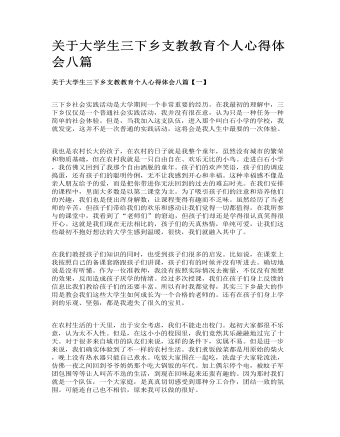
关于大学生三下乡支教教育个人心得体会八篇
在我们教授孩子们知识的同时,也受到孩子们很多的启发。比如说,在课堂上我按照自己的备课套路跟孩子们讲课,孩子们有的时候并没有听进去。确切地说是没有听懂。作为一位准教师,我没有按照实际情况去衡量,不仅没有预想的效果,反而造成孩子厌学的情绪。经过多次授课,我们在孩子们身上反馈的信息比我们教给孩子们的还要丰富。所以有时我都觉得,其实三下乡最大的作用是教会我们这些大学生如何成长为一个合格的老师的。还有在孩子们身上学到的乐观、坚强,都是我遗失了很久的宝贝。
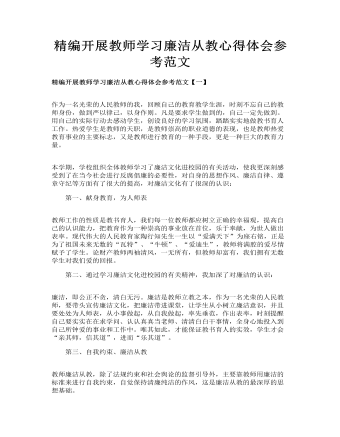
精编开展教师学习廉洁从教心得体会参考范文
第一、献身教育,为人师表 教师工作的性质是教书育人,我们每一位教师都应树立正确的幸福观,提高自己的认识能力,把教育作为一种崇高的事业放在首位,乐于奉献,为世人做出表率。现代伟大的人民教育家陶行知先生一生以“爱满天下”为座右铭,正是为了祖国未来无数的“瓦特”、“牛顿”、“爱迪生”,教师将满腔的爱尽情赋予了学生。论财产教师两袖清风,一无所有,但教师却富有,我们拥有无数学生对我们爱的回报。
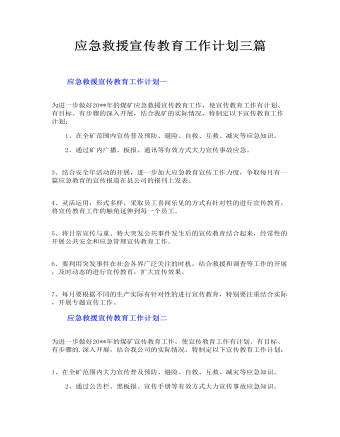
应急救援宣传教育工作计划三篇
1、在全矿范围内宣传普及预防、避险、自救、互救、减灾等应急知识。 2、通过矿内广播、板报、通讯等有效方式大力宣传事故应急。 3、结合安全年活动的开展,进一步加大应急教育宣传工作力度,争取每月有一篇应急教育的宣传报道在县公司的报刊上发表。 4、灵活运用,形式多样,采取员工喜闻乐见的方式有针对性的进行宣传教育,将宣传教育工作的触角延伸到每一个员工。
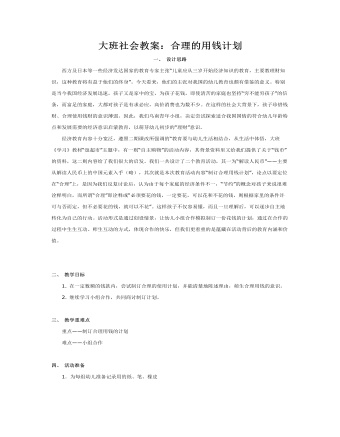
大班社会教案:合理的用钱计划
经济教育内容十分宽泛,遵照二期课改所强调的“教育要与幼儿生活相结合,从生活中体悟,大班《学习》教材“逛超市”主题中,有一则“自主购物”的活动内容,其背景资料里又给我们提供了关于“钱币”的资料,这二则内容给了我们很大的启发。我们一共设计了二个教育活动,其一为“解读人民币”——主要从解读人民币上的中国元素入手(略),其次就是本次教育活动内容“制订合理用钱计划”,论点以要定位在“合理”上,是因为我们反复讨论后,认为由于每个家庭的经济条件不一,“节约”的概念对孩子来说很难诠释明白,而所谓“合理”即诠释或“必须要花的钱,一定要花,可以花和不花的钱,则根据家里的条件许可与否而定,但不必要花的钱,就可以不花”。这样孩子不仅容易懂,而且一旦理解后,可以逐步自主地转化为自己的行动。活动形式是通过创设情景,让幼儿小组合作模拟制订一份花钱的计划,通过在合作的过程中生生互动、师生互动的方式,体现合作的快乐,但我们更看重的是蕴藏在活动背后的教育内涵和价值。
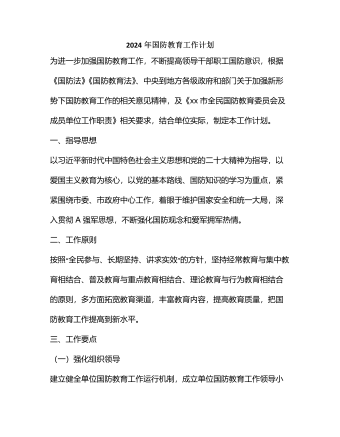
2024年国防教育工作计划要点
1.高度重视。国防教育是增强民族凝聚力、提高全面素质、构建和谐社会的重要途径,干部职工必须深刻认识国防教育的重要意义,切实把国防教育工作融入单位日常工作,明确各部室职责,形成由主要领导亲自带头抓,分管领导配合抓,中层干部具体抓的工作格局。2.健全机制。建立健全国防教育工作机制,明确工作职责,坚持把国防教育工作与日常工作相结合,全面普及国防知识教育,不断增强广大干部职工履行国防义务的意识和能力,保证国防教育工作扎实有效开展。3.讲求实效。要坚持经常教育与集中教育相结合、普及教育与重点教育相结合、理论教育与行为教育相结合,不断创新工作方式方法,精心组织、周密部署,有针对性地开展形式多样的宣传教育活动,切实提高干部职工和广大群众国防意识,普及国防观念,确保各项活动落到实处、取得实效。
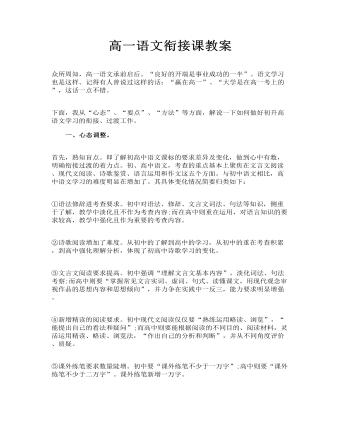
高一语文衔接课教案
一、心态调整。 首先,熟知盲点。即了解初高中语文课标的要求差异及变化,做到心中有数,明确衔接过渡的着力点。初、高中语文,考查的重点基本上聚焦在文言文阅读、现代文阅读、诗歌鉴赏、语言运用和作文这五个方面。与初中语文相比,高中语文学习的难度明显在增加了。其具体变化情况简要归类如下: ①语法修辞进考查要求。初中对语法、修辞、文言文词法、句法等知识,侧重于了解,教学中淡化且不作为考查内容;而在高中则重在运用,对语言知识的要求较高,教学中强化且作为重要的考查内容。 ②诗歌阅读增加了难度。从初中的了解到高中的学习,从初中的重在考查积累,到高中强化理解分析,体现了初高中诗歌学习的变化。
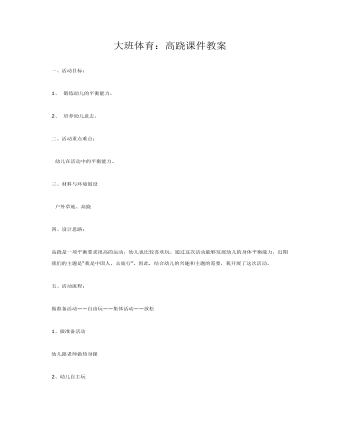
大班体育:高跷课件教案
2、 培养幼儿意志。二、活动重点难点: 幼儿在活动中的平衡能力。三、材料与环境创设 户外草地、高跷
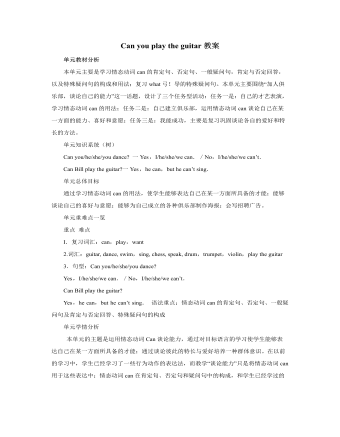
人教版新目标初中英语七年级上册Can you play the guitar教案
本单元主要是学习情态动词can的肯定句、否定句、一般疑问句,肯定与否定回答,以及特殊疑问句的构成和用法;复习what弓!导的特殊疑问句。本单元主要围绕“加人俱乐部,谈论自己的能力”这一话题,设计了三个任务型活动:任务一是:自己的才艺表演,学习情态动词can的用法;任务二是:自己建立俱乐部,运用情态动词can谈论自己在某一方面的能力、喜好和意愿;任务三是:我能成功,主要是复习巩固谈论各自的爱好和特长的方法。单元知识系统(树)Can you/he/she/you dance? 一Yes,I/he/she/we can./No,I/he/she/we can’t.Can Bill play the guitar?一Yes,he can,but he can’t sing.单元总体目标通过学习情态动词can的用法,使学生能够表达自己在某一方面所具备的才能;能够谈论自己的喜好与意愿;能够为自己成立的各种俱乐部制作海报;会写招聘广告。单元重难点一览重点 难点I.复习词汇:can,play,want2.词汇:guitar, dance, swim,sing, chess, speak, drum,trumpet,violin,play the guitar3.句型:Can you/he/she/you dance?Yes,I/he/she/we can./No,I/he/she/we can’t.Can Bill play the guitar?

人教版新目标初中英语七年级上册How much are these pants教案
个性练习设计 阅读广告:在日常生活中,人们去买东西之前,一般要阅读广告,从广告中获取该商品的一些有用信息,包括价格、性能等。所以给学生提供有些商品的广告或让学生去商店去阅读一些商品的广告,从中获取商品的价格,即可以锻炼学生的阅读能力,又能提高实践能力。 Self Check 教学内容 Self Check(教材P42) 教学目标 知识与能力 复习词汇pant,sock,T-shirt,sweater,shoes,color,black,white,red,green,blue,big,short,long,数字10--31; 学习词汇Zig Zag,clothes,shop,yellow,ask,which;学会谈论服装的价格、颜色、大小和长短;学会填写价格标签。 过程与方法 运用Summarizing和Classifying的学习策略。在复习教学中,运用听写、绘画、互相询问调查与检测等手段,促使学生不断地使用所学内容,从而提高他们灵活运用知识的能力。 情感态度价值观 该部分学习内容主要是复习谈论服装的价格和颜色以及对服装的喜好,能引起学生的共鸣;通过购物的对话练习教学生学会购物时使用的礼貌用语和如何感谢人。

人教版新目标初中英语七年级下册How was your weekend教案2篇
Teaching Goal:1. General aims:Talk about recent past events2. Particular aims:A. Language Focus.Talk about recent past events and think of the past events.B. Language goalsHow was….?It was …What did …do over the weekend?C. Language structures:(1). How was your weekend? I was great. Pay attention to no form.(2). What did you do over the weekend? I played soccer. We went to the beach.D. Useful words and phrases:Words: was, did, went, beach, over, project, test, wasn’t, false, number, geography, spend, week, most, mixture, their, had, little, cook, read, saw, change, everyone, sit, sat, no, anythingPhrases: did one’s homework, played soccer, cleaned my room, went to the beach, played tennis, went to the movies, on Saturday morning, over the weekend, cook … for, what about, do some reading, have a party, talk show, go shoppingE. Grammar language:Present simple past tenseRegular and irregular verbsF. Learning strategies:Tour and holidaysG. Interdiscipinary:H. Emotion and manner:Teaching time: 5 periodsTeaching procedures:Period One教学步骤、时间 教师活动 学生活动 媒体应用Step 1Free talk 3’ Ask some questions like:Who’s on duty today?What’s the weather like? Answer and talk about something.让同学们回答下列问题1. Do you like weekend? (Let some students answer)It takes them three minutes to talk about the question.2. Why do you like weekend? (let the students answer) Most of the students like the weekend此时教师用汉语问:“在周末期间问你干了什么?这句话用英语这么回答?Let the students guess.At last the teacher give them right answer3. What did you do over the weekend?(板书、学习)
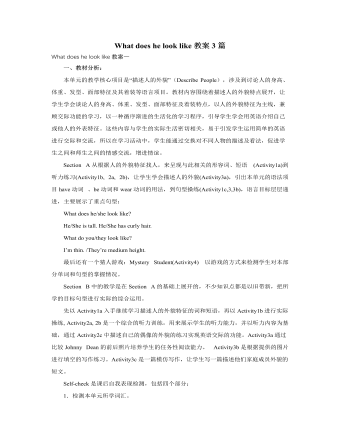
人教版新目标初中英语七年级下册What does he look like教案3篇
所需要用到的句子:Who is that?That is Jack. I like him.Why do you like him?I like him because he is interesting.Task 4: 设计理想中的人类Step one: 设计理想中的人类的外貌。把全班同学分成若干小组,学生可以边说边在纸上画出他们的模样。Step two: 设计理想中人类的性格。学生们可以把那些能描述性格的单词写在图画的旁边。Step three: 每组选出一名同学,其他同组同学提问,他作简单回答,并说明原因。所需用到的句子:What does he or she look like?He or she ...What is he or she like?He or she is ...Why?Because ...Task 5: 挑战性活动调查性格是天生的还是后天形成的,让每个同学回家去调查一下自己成长过程中性格是否有变化,具体是怎样的,为什么会这样? Teaching Aims:1. Enable students to have a general understanding of how to talk about people's physical appearance.2. Enable students to tackle some essential vocabularies and patterns about describing people. Provide them with necessary skills and methods.3. Create various chances for students to describe the persons they're familiar with, such as classmates, family members, teachers, idols, etc.
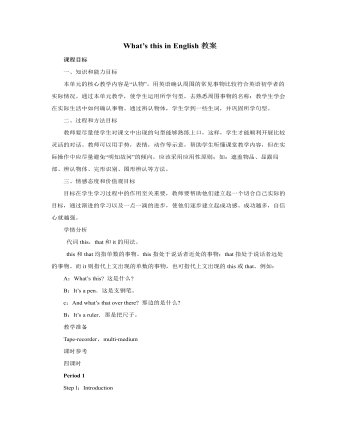
人教版新目标初中英语七年级上册What’s this in English教案
一、知识和能力目标本单元的核心教学内容是“认物”。用英语确认周围的常见事物比较符合英语初学者的实际情况。通过本单元教学,使学生运用所学句型,去熟悉周围事物的名称;教学生学会在实际生活中如何确认事物。通过辨认物体,学生学到一些生词,并巩固所学句型。二、过程和方法目标教师要尽量使学生对课文中出现的句型能够熟练上口,这样,学生才能顺利开展比较灵活的对话。教师可以用手势,表情,动作等示意,帮助学生听懂课堂教学内容,但在实际操作中应尽量避免“明知故问”的倾向,应该采用应用性原则;如:遮盖物品、显露局部、辨认物体、完形识别、图形辨认等方法。三、情感态度和价值观目标目标在学生学习过程中的作用至关重要,教师要帮助他们建立起一个切合自己实际的目标,通过渐进的学习以及一点一滴的进步,使他们逐步建立起成功感。成功越多,自信心就越强。
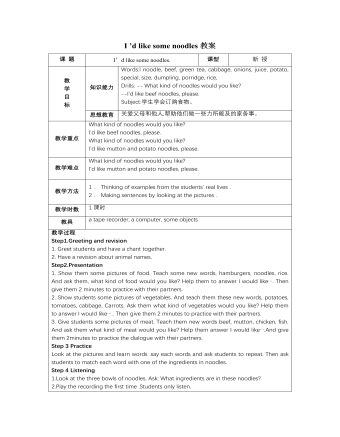
人教版新目标初中英语七年级下册I ’d like some noodles教案
教学过程Step 1: warming-up Sing a song---------“food and drink” Step 2: Revision1 Dictation2 Revise: What kind of noodles would you like?I’d like …What size bowl of noodles would you like?I’d like…Step 3: Presentation1 show pictures of food, ask students say the words.2 Students read the newspaper ad in 3a. Fill in blanks with words in the box. Then read the ad together, the teacher explains some difficult language points.3 Check the answers Step 4 PracticeAsk students to finish 3b in the same way according to 3a. Students read the short passage and fill in the blanks .At last, check the answers.Step 5 productionAsk students to write their own ad for dumplings, noodles, drinks, and other foods they know. Then ask students to read their partner’s ad. Then order food and drink from their partner.Step 6 Home workGroup work – make an ad about “food and drink”
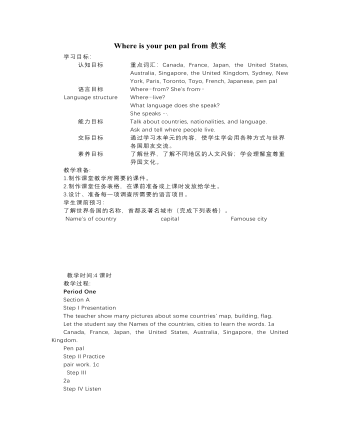
人教版新目标初中英语七年级下册Where is your pen pal from教案
2.1Match the country with the language.Step II Reading3a? let the students read the letter fast and answer the questions.? Let the students ask more questions about the letter as possible as the can.Step III Writing3b.Step IV. Pairwork2cStep V Listening2a, 2bStep V. HomeworkExercises book(1) P3Exercises book (2) P3Period FourStep I . Dictate the words and sentences in Unit1.Step II. Self-checkStep III. Check the answers for Exercises book in the unit.Step IV. Home workRevise and preparation for unit 2.教学反思:通过本单元的学习,学生基本可以谈论人们的国籍,居住城市及其所说的语言,通过书信方式去介绍自己并寻找笔友。但在涉及到国外的一些城市时,学生对这方面的知识相对欠缺,能介绍的城市并不多,也反应出学生课前预习不充分,这跟学生学习条件也有关,大多数学生无法通过网络获取所需信息。因此,在以后的教学中要多指导学生通过计算机网络获取信息,拓宽知识面。
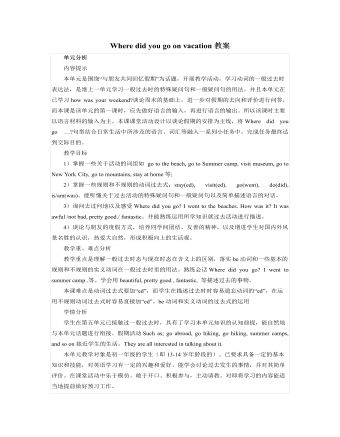
人教版新目标初中英语七年级下册Where did you go on vacation教案
句型: Where did you go on vacation? I went to summer camp.Did she go to Central Park?Yes,she did.No, she didn’t语法:一般过去时特殊疑问句、一般疑问句及肯、否定回答。课时安排4课时第一课时:Section A:la,1b,lc,2a,2b,2c 第二课时:Section A:3a,3b,4第三课时:Section B:1,2a,2b,2c第四课时:Section B:3a,3b,3c,4 and Self Check第一课时教学目标掌握描写假期生活的形容词。假期里自己所做事情的简单表达。谈论假期做的事情及当时情况。谈论假期时旅游的天气,旅游者以及食物等。教学过程一、导入播放一首英文歌曲:Let’s travel 说明:通过让学生听节奏欢快迪斯尼英语歌曲Let’s travel.引入本节课谈论的话题vacation and travel. 让歌曲使学生的思维活跃,增强课堂气氛,激发学生提高学习英语的兴趣。T:How is the trip ?Ss : It’s pretty good/ happy/exciting /relaxing/busy/dangerous/ fantastic说明:这个问题是为了操练形容词。建议让多个Ss作答。鼓励他们用不同的形容词。上述个别形容词本应在第二课时中出现,但可以在warming-up中第一次非正式出现。这些形容词也可在老师的评价语中适时出现,以加深学生对词汇的印象。

人教版新目标初中英语八年级上册Can you come to my party教案3篇
Step 3 (3b)First, tell the students when we talk about our future plans, we often use: I’m+verb+ing When we talk about what we must do, we use have to. Ask the students to fill in the blanks in 3b. The answers are: shopping, go to see, a test, I’m going, my family. Step 4 (3c)Let the students write an e-mail message to a friend. Say why you can’t visit next. Before the exercise, ask the students to give some possible answers and write them on the blackboard. So the students will feel easy to finish the writing exercise. After they finish it, Let them to correct it in groups first. Each group chooses theirs best one to read in front of the whole class. Step 5 ( planning a party )First read the conversation in the box together. Then ask the students to turn to page 88.Write down everything you have to do next week. Write in all the things you have to do . Ask the students to look at the list. Ask them “What day are you free?” This is when you can have your party. Step 6 (Self check 1 )Let the students to fill in the blanks with the words given. Change the forms of the words if possible. Then make their own sentences. The answers are: visit, playing, have to, study, comeStep 7 (Self check 2)Imagine you are Marie. Read the information and look at your schedule. Write replies to the invitation.
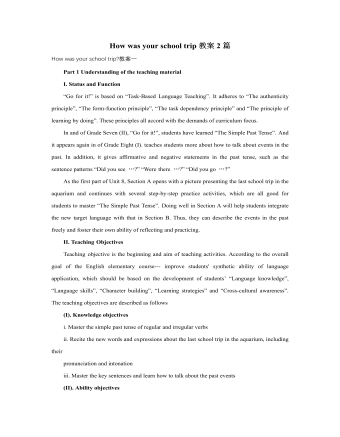
人教版新目标初中英语八年级上册How was your school trip教案2篇
“Go for it!” is based on “Task-Based Language Teaching”. It adheres to “The authenticity principle”, “The form-function principle”, “The task dependency principle” and “The principle of learning by doing”. These principles all accord with the demands of curriculum focus.In and of Grade Seven (II), “Go for it!”, students have learned “The Simple Past Tense”. And it appears again in of Grade Eight (I). teaches students more about how to talk about events in the past. In addition, it gives affirmative and negative statements in the past tense, such as the sentence patterns “Did you see …?” “Were there …?” “Did you go …?” As the first part of Unit 8, Section A opens with a picture presenting the last school trip in the aquarium and continues with several step-by-step practice activities, which are all good for students to master “The Simple Past Tense”. Doing well in Section A will help students integrate the new target language with that in Section B. Thus, they can describe the events in the past freely and foster their own ability of reflecting and practicing. II. Teaching ObjectivesTeaching objective is the beginning and aim of teaching activities. According to the overall goal of the English elementary course--- improve students' synthetic ability of language application, which should be based on the development of students’ “Language knowledge”, “Language skills”, “Character building”, “Learning strategies” and “Cross-cultural awareness”. The teaching objectives are described as follows(I). Knowledge objectivesi. Master the simple past tense of regular and irregular verbsii. Recite the new words and expressions about the last school trip in the aquarium, including their pronunciation and intonation


